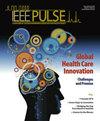医疗保健系统的扩展现实:当代研究的最新进展
IF 0.3
4区 医学
Q4 ENGINEERING, BIOMEDICAL
引用次数: 0
摘要
在与患者模拟器系统合作后,并且在这一点上,这位评论家已经使用眼系统探索各种虚拟现实(VR)记录了几个月,他认为以上标题可能值得IEEE Pulse的读者阅读和回顾。根据出版商的网站广告,本文的读者可能是“扩展现实技术专家和工程师,生物医学工程和扩展现实专业的学生,仪器和测量技术专家和工程人员,计算机科学家;对在外科手术中使用扩展实现感兴趣的医疗保健专业人员。”,我们承诺将“详细介绍扩展现实”,讨论“未来研究、潜在影响以及在医疗保健中采用XR的好处和好处”(XR在这里被定义为扩展现实),以及与该技术相关的案例和案例研究。该文本由34人撰写的15章组成,其中两人是四位被点名的编辑之一。以下是对各章的简要回顾1。本文章由计算机程序翻译,如有差异,请以英文原文为准。
Extended Reality for Health Care Systems: Recent Advances in Contemporary Research
Having worked with patient simulator systems, and at this point having used an oculus system to explore various virtual reality (VR) recordings for several months, this reviewer thought the above title might be worth reading and reviewing for the readers of IEEE Pulse. Per the publisher’s website advertising, the readership of this text might be “Extended reality technologists and engineers, students in biomedical engineering and extended reality, Instrumentation and measurement technologist and engineers, Computer Scientist; Health care professionals with an interest in using extended reality in surgery.” From the preface, we are promised an “elaborate introduction to extended reality,” a discussion of “future research, potential impacts, and benefits and benefits of XR adoption in health care” (XR is here defined as extended reality), as well as cases and case studies relating to the technology. The text comprises 15 chapters contributed by 34 individuals, two of whom are among the four named editors. A brief review of the chapters1 follows.
求助全文
通过发布文献求助,成功后即可免费获取论文全文。
去求助
来源期刊

IEEE Pulse
ENGINEERING, BIOMEDICAL-
CiteScore
1.10
自引率
0.00%
发文量
88
审稿时长
6-12 weeks
期刊介绍:
IEEE Pulse covers both general and technical articles on current technologies and methods used in biomedical and clinical engineering; societal implications of medical technologies; current news items; book reviews; patent descriptions; and correspondence. Special interest departments, students, law, clinical engineering, ethics, new products, society news, historical features and government.
 求助内容:
求助内容: 应助结果提醒方式:
应助结果提醒方式:


